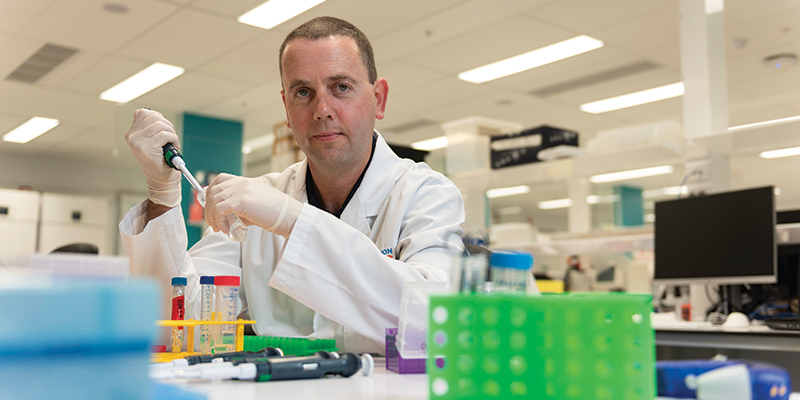Search

News & Events
Pioneering research could be key to keeping cancer in checkCancer research is being reimagined after a collaboration between The Kids Research Institute Australia, the Peter Doherty Institute for Infection and Immunity.

News & Events
The Kids Research Institute Australia researchers share in TPCHRF fundingEight The Kids Research Institute Australia researchers are among those who have received grant funding from the Telethon-Perth Children’s Hospital Research Fund (TPCHRF).
Research
In vivo loss of tumorigenicity in a patient-derived orthotopic xenograft mouse model of ependymomaEpendymomas (EPN) are the third most common malignant brain cancer in children. Treatment strategies for pediatric EPN have remained unchanged over recent decades, with 10-year survival rates stagnating at just 67% for children aged 0-14 years. Moreover, a proportion of patients who survive treatment often suffer long-term neurological side effects as a result of therapy. It is evident that there is a need for safer, more effective treatments for pediatric EPN patients.
Research
PI3K/mTOR is a therapeutically targetable genetic dependency in diffuse intrinsic pontine gliomaDiffuse midline glioma (DMG), including tumors diagnosed in the brainstem (diffuse intrinsic pontine glioma; DIPG), are uniformly fatal brain tumors that lack effective treatment.
Research
Blinatumomab Added to Chemotherapy in Infant Lymphoblastic LeukemiaKMT2A-rearranged acute lymphoblastic leukemia (ALL) in infants is an aggressive disease with 3-year event-free survival below 40%. Most relapses occur during treatment, with two thirds occurring within 1 year and 90% within 2 years after diagnosis. Outcomes have not improved in recent decades despite intensification of chemotherapy.
Research
Bile Acids and Microbiota Interplay in Pancreatic CancerEvidence suggests the involvement of the microbiota, including oral, intra-tumoral and gut, in pancreatic cancer progression and response to therapy. The gut microbiota modulates the bile acid pool and is associated with maintaining host physiology. Studies have shown that the bile acid/gut microbiota axis is dysregulated in pancreatic cancer.
Research
Geldanamycin treatment does not result in anti-cancer activity in a preclinical model of orthotopic mesotheliomaMesothelioma is characterised by its aggressive invasive behaviour, affecting the surrounding tissues of the pleura or peritoneum. We compared an invasive pleural model with a non-invasive subcutaneous model of mesothelioma and performed transcriptomic analyses on the tumour samples.
Research
Survival Outcomes of Children with Relapsed or Refractory Myeloid Leukemia Associated with Down syndromeChildren with Down syndrome (DS) are at a significantly higher risk of developing acute myeloid leukemia, also termed myeloid leukemia associated with DS (ML-DS). In contrast to the highly favorable prognosis of primary ML-DS, the limited data that are available for children who relapse or who have refractory ML-DS (r/r ML-DS) suggest a dismal prognosis. There are few clinical trials and no standardized treatment approach for this population.
Research
Conventional Therapies Deplete Brain-Infiltrating Adaptive Immune Cells in a Mouse Model of Group 3 Medulloblastoma Implicating Myeloid Cells as Favorable Immunotherapy TargetsMedulloblastoma is the most common childhood brain cancer. Mainstay treatments of radiation and chemotherapy have not changed in decades and new treatment approaches are crucial for the improvement of clinical outcomes. To date, immunotherapies for medulloblastoma have been unsuccessful, and studies investigating the immune microenvironment of the disease and the impact of current therapies are limited.
Research
Characteristics of patients ≥10 years of age with diffuse intrinsic pontine glioma: a report from the International DIPG/DMG RegistryDiffuse intrinsic pontine gliomas generally occur in young school-age children, although can occur in adolescents and young adults. The purpose of this study was to describe clinical, radiological, pathologic, and molecular characteristics in patients ≥10 years of age with DIPG enrolled in the International DIPG Registry.
